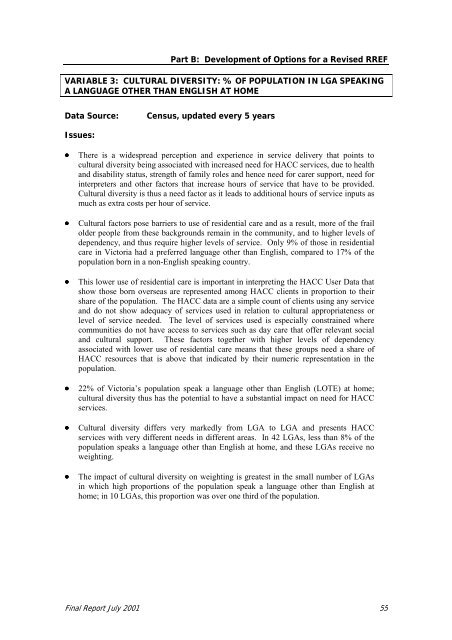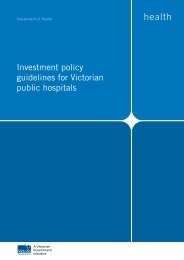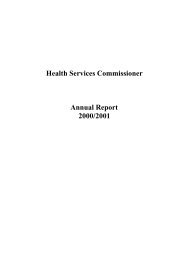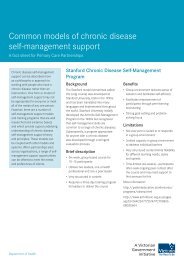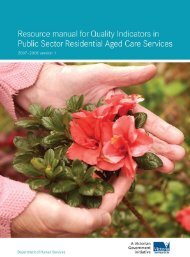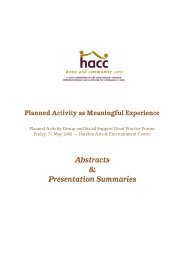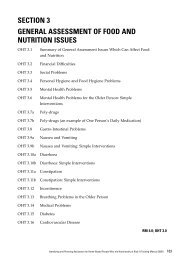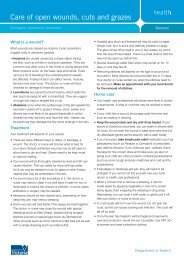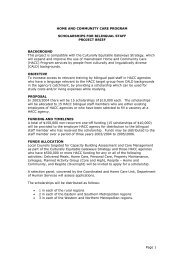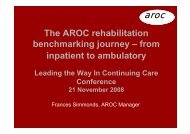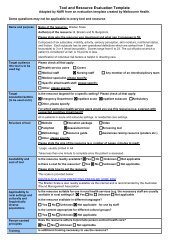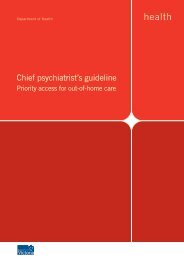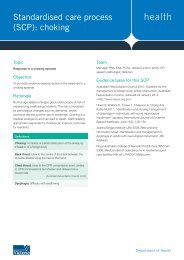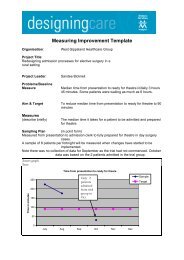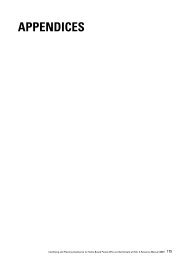Final Report on RREF 2001 - Department of Health
Final Report on RREF 2001 - Department of Health
Final Report on RREF 2001 - Department of Health
Create successful ePaper yourself
Turn your PDF publications into a flip-book with our unique Google optimized e-Paper software.
Part B: Development <strong>of</strong> Opti<strong>on</strong>s for a Revised <strong>RREF</strong><br />
VARIABLE 3: CULTURAL DIVERSITY: % OF POPULATION IN LGA SPEAKING<br />
A LANGUAGE OTHER THAN ENGLISH AT HOME<br />
Data Source:<br />
Census, updated every 5 years<br />
Issues:<br />
• There is a widespread percepti<strong>on</strong> and experience in service delivery that points to<br />
cultural diversity being associated with increased need for HACC services, due to health<br />
and disability status, strength <strong>of</strong> family roles and hence need for carer support, need for<br />
interpreters and other factors that increase hours <strong>of</strong> service that have to be provided.<br />
Cultural diversity is thus a need factor as it leads to additi<strong>on</strong>al hours <strong>of</strong> service inputs as<br />
much as extra costs per hour <strong>of</strong> service.<br />
• Cultural factors pose barriers to use <strong>of</strong> residential care and as a result, more <strong>of</strong> the frail<br />
older people from these backgrounds remain in the community, and to higher levels <strong>of</strong><br />
dependency, and thus require higher levels <strong>of</strong> service. Only 9% <strong>of</strong> those in residential<br />
care in Victoria had a preferred language other than English, compared to 17% <strong>of</strong> the<br />
populati<strong>on</strong> born in a n<strong>on</strong>-English speaking country.<br />
• This lower use <strong>of</strong> residential care is important in interpreting the HACC User Data that<br />
show those born overseas are represented am<strong>on</strong>g HACC clients in proporti<strong>on</strong> to their<br />
share <strong>of</strong> the populati<strong>on</strong>. The HACC data are a simple count <strong>of</strong> clients using any service<br />
and do not show adequacy <strong>of</strong> services used in relati<strong>on</strong> to cultural appropriateness or<br />
level <strong>of</strong> service needed. The level <strong>of</strong> services used is especially c<strong>on</strong>strained where<br />
communities do not have access to services such as day care that <strong>of</strong>fer relevant social<br />
and cultural support. These factors together with higher levels <strong>of</strong> dependency<br />
associated with lower use <strong>of</strong> residential care means that these groups need a share <strong>of</strong><br />
HACC resources that is above that indicated by their numeric representati<strong>on</strong> in the<br />
populati<strong>on</strong>.<br />
• 22% <strong>of</strong> Victoria’s populati<strong>on</strong> speak a language other than English (LOTE) at home;<br />
cultural diversity thus has the potential to have a substantial impact <strong>on</strong> need for HACC<br />
services.<br />
• Cultural diversity differs very markedly from LGA to LGA and presents HACC<br />
services with very different needs in different areas. In 42 LGAs, less than 8% <strong>of</strong> the<br />
populati<strong>on</strong> speaks a language other than English at home, and these LGAs receive no<br />
weighting.<br />
• The impact <strong>of</strong> cultural diversity <strong>on</strong> weighting is greatest in the small number <strong>of</strong> LGAs<br />
in which high proporti<strong>on</strong>s <strong>of</strong> the populati<strong>on</strong> speak a language other than English at<br />
home; in 10 LGAs, this proporti<strong>on</strong> was over <strong>on</strong>e third <strong>of</strong> the populati<strong>on</strong>.<br />
<str<strong>on</strong>g>Final</str<strong>on</strong>g> <str<strong>on</strong>g>Report</str<strong>on</strong>g> July <strong>2001</strong> 55


